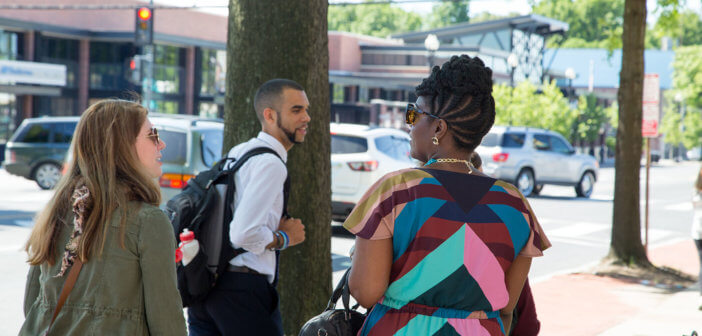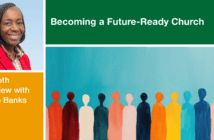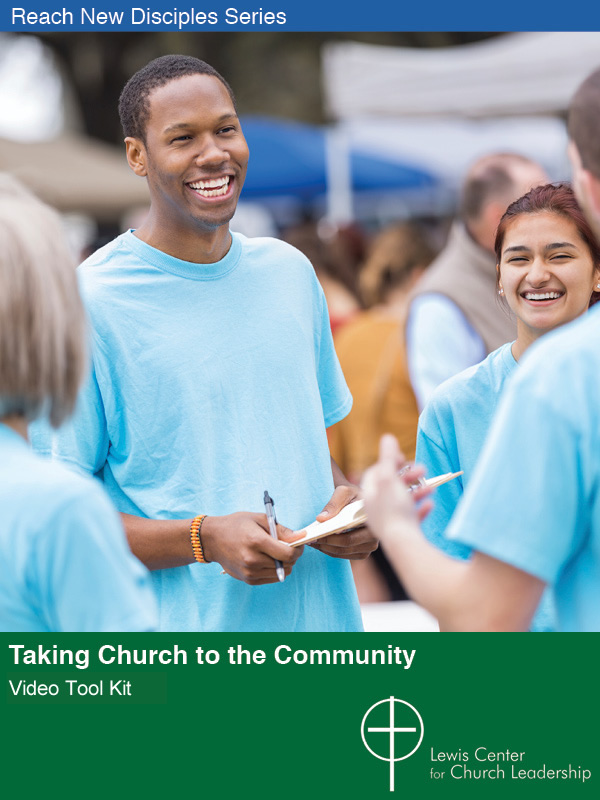Sam Marullo and Doug Powe, both Wesley Theological Seminary faculty members, have developed a simple model to help congregations engage their communities in meaningful ways. They outline four reflective practices — inquiry, imagination, incarnation, and imminence — to guide a church in connecting with its neighbors.
How can churches engage their communities in meaningful ways? Many congregations struggle to figure out a means of consistently engaging those in their community, especially if the neighborhood is transitioning. Consider a congregation that has been in a community for over 50 years but is seeing a shift in age and racial diversity. What are some practical things this church can do to connect with its new neighbors?
Let us suggest four reflective practices: inquiry, imagination, incarnation, and imminence. We call this the “4-I Model,” and any congregation can integrate these practices of ministry.
1. Inquiry
Inquiry is being intentional about examining the world as it is. Inquiry seeks to discover both the challenges of the world around us — the places where we see God’s heart breaking — and the gifts and blessings that are already present in the community. Inquiry uses observation and ministry tools like MissionInsite (Census tools) to understand the community context and the ministries already in place.
The key is to enter into the community with an understanding and appreciation of the cultural complexity it contains and a sensitivity to its diversity. Our role is not to come in as experts but with an openness to understanding what is already taking place. We enter with our questions to learn from the community the strengths and values that bring it life. We enter with eyes and hearts that are open and keenly seeking the presence of the Holy Spirit in order to appreciate the reconciling and redeeming work that is already underway. Using this approach, we are not doing things to the community, but we are seeking to learn the ways the community is already expressing hospitality. Taking the time for inquiry will ingratiate a congregation with its community.
2. Imagination
Imagination involves asking ourselves, “What could be done if God’s will were done on earth as it is in heaven?” We seek wisdom from those that have come before us and those in the community. From those who have come before us, we learn about “promising practices” that can help spark ideas for our context. We enter into relationships to understand better the wisdom and inspiration of the community with which we are engaged. It is critical that we do not ignore our traditions and our sacred stories for inspiration as to how we are to respond. And we pray for the guidance and wisdom of the Spirit to inspire us with glimpses of the Reign of God that will draw us in closer.
The response is not the typical model of the church figuring out how to deliver goods. The response is about seeking approaches that include everyone in the community collaborating to make a difference. While those in the community may not share our theological language, imagining this sort of response is our effort to participate in the reign of God.
3. Incarnation
Christians typically speak of Jesus becoming incarnate in human form and being with us. God literally becomes human and experiences all the particularities of life. An incarnational approach to community ministry means learning and practicing in a contextual manner. An incarnational approach requires connecting with individuals who have a stake in a particular community. This means connecting with religious leaders, parishioners, residents, business owners, unhoused individuals, and all others. An incarnational approach to community ministry is not simply church or agency focused. It calls us to “live into” our communities in real and present ways.
We embody a new way of being a faith community. The work we do is not about a selfish interest that benefits the church. We live out our biblical story of incarnation and seek to help the community to experience God’s transforming love, grace, and justice.
4. Imminence
For Christians this term focuses on our hope for the transformation that is occurring and is yet to come. As Christians we are participating in God’s work of transformation when we encourage those in the community to live into what God is doing. This means working with the partners in the community to make a concrete difference. It means doing something that is measurable, while understanding that the work we do is never the final word and that God’s work of transformation is ongoing. Too often we start something in the community and see it as a quick fix or, at the other extreme, we never develop measurements to determine what difference we are making. Imminence recognizes we must negotiate an ongoing ministry response that requires ongoing metrics.
Effective community ministry is inquisitive, imaginative, incarnational, and imminent. We see these as the four key practices of community engagement.
Related Resources
- 5 Key Practices for Connecting with Your Context by Mark Gornik And Maria Liu Wong
- Adopting a Missionary Mindset by Douglas Ruffle
- Connect with Your Neighbors Video Tool Kit







